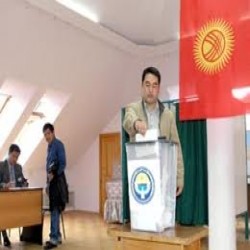Analytics
The best Experts' Views, Marks and Forecasts on Economics >>
Rules of Entry and Participation. Become a Member of Professional Society of Economic Journalists! >>

BISHKEK – Election observers are generally pleased with preparations for the upcoming October 30 presidential election and have praised the work of the Central Election Commission (CEC).
·
Pedestrians stroll past a billboard for front-running presidential candidate Almazbek Atambayev in Dzhalal-Abad October 26. Atambayev, who stepped down as prime minister to run, has been accused of misusing government resources in his campaign. [Alisher Karimov]
·
A billboard for presidential candidate Kamchibek Tashiyev looms over a sidewalk in Arashan village outside Bishkek October 26. [REUTERS/Vladimir Pirogov]
The CEC is doing a good job, said Alikbek Zhekshenkulov, leader of the Akyikat Party and a former foreign minister, adding, “All the information has been open and provided by the CEC in full.”
The Coalition for Civil Society and Democracy, in its analysis for October12-22, said it “is pleased” with the work of the CEC, adding that the CEC has paid attention to complaints from NGOs and citizens.
The Coalition for Civil Society and Democracy and the OSCE had expressed concern about closed CEC meetings, but the OSCE report for October 4-17 said most CEC meetings have been open to observers, candidates and the media.
Yevgeny Tagiyev, an analyst from the Election Plus Centre, expects election turnout to reach at least 60% of the 2.8m registered voters.
“The people want peace, a normal job and stability, and everyone is expecting to get this from his or her candidate,” he said.
Zhekshenkulov didn’t estimate turnout, but said, “I see that the public has a keen interest in the elections, and the turnout of Kyrgyz citizens at the polling stations will be high.”
The mood is set for the election, but typical rumours are clouding things somewhat.
“Kyrgyzstan is ready for elections now more than ever. ... These elections are stained with blood, and for this reason the people are hungry for voting day,” said Togtogul Kakchekeyev, a political scientist.
However, candidates and analysts are talking about what they say is the active use of negative PR and government resources by candidates.
Such activities have long been associated with Kyrgyz elections, Kakchekeyev said.
“Given that the habit is in our nature, I suspect that this time will be no different,” he said, adding that such allegations typically swirl.
The Taza Shailoo Association, the Organisation for Security and Co-operation in Europe (OSCE), and the Coalition for Civil Society and Democracy have all reported complaints that some candidates have been using government resources to benefit their campaigns, but they all said there was no evidence to back up the charges.
In the Taza Shailoo report, Social-Democrat Almazbek Atambayev, who resigned as prime minister to run, was cited more than any other candidate for allegedly misusing public resources.
“He has the biggest campaign budget (35.5m KGS or $790,000),” noted political scientist Bakyt Beketayev, so it follows that he is an easier target.
One allegation is that teachers are “being forced to campaign for Atambayev under threat of dismissal,” Aziza, a biology teacher in Osh, said.
“The threat of dismissal has been hanging not only over public employees who have been forced to campaign for him, but also over government officials,” MP Talant Mamirov said. “Everyone knows about this, but they are keeping quiet.”
But Farid Niyazov, a spokesman for Atambayev campaign headquarters, denied the allegations.
“Atambayev's campaign has not used and will not use negative PR and government resources,” he said. “Atambayev does not need to.”
The reports most likely arose out of “a smear campaign” by the other candidates, Tagiyev said.
And when it comes to using government agencies, “It is not fair to say that only Atambayev is using government resources,” said MP Akylbek Zhaparov, who said most candidates are doing that.
Post-election security also remains a concern.
The losing candidates could take to the streets, warned Abdumalik Sharipov, a rights activist from the NGO Justice.
“In 2000, Kamchibek Tashiyev ran for parliament but lost,” Sharipov recalled. “Believing that the election had been stolen, he led his fellow villagers to Dzhalal-Abad from his home village, 5km from the city. At noon, about 2,000 people blocked the main street of the oblast capital.”
Some have sensed moves toward similar action already.
“The candidates who may not get to the second round are already gathering their forces. They have a chronic lust for power,” Kakchekeyev said. But to prevent similar incidents from occurring, on October 20 the Interior Ministry put all of its employees on high alert, according to Rakhmatillo Akhmedov, a ministry spokesman.
“Three police officers and five to seven volunteer patrol members will be on duty at each polling station. Nearly 7,000 police officers will be providing security at polling stations and government buildings.”
The Interior Ministry office will respond quickly to any possible conflicts, MP Roza Aknazarova said. However, she said she hopes “there will be no disturbances at the elections, and the candidates will not lead their supporters onto the streets if they lose.”
By Alisher Karimov, Asker Sultanov, and Asyl Osmonaliyeva